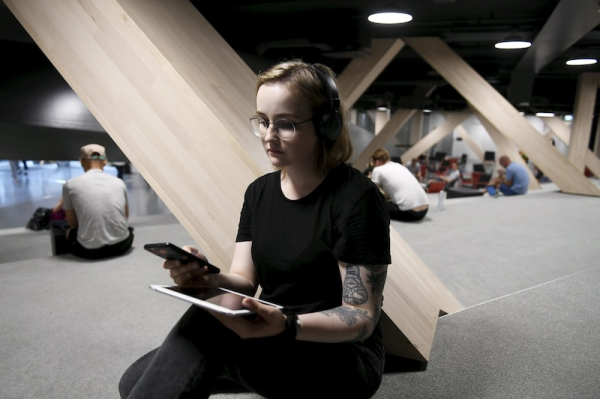
A young woman is using social media inside the Oodi Central Library in Helsinki. LEHTIKUVA
- Next Article Finland’s rising unemployment bucks EU trend
Finnish well-being, once a cornerstone of national pride, has experienced a significant decline since the onset of the 2020s, according to a newly released report by the Kalevi Sorsa Foundation. The report, titled State of Inequality in Finland 2024, reveals that a series of global and domestic crises have taken a profound toll on the happiness and satisfaction of Finns, with particularly alarming effects on the nation’s youth.
The study highlights how the COVID-19 pandemic, the war in Ukraine, and the resulting surge in living costs have collectively contributed to a steep decline in the population’s overall well-being. Finnish satisfaction with life, historically high for decades, has dropped sharply, marking one of the most significant deteriorations seen in recent history.
The report, authored by 15 researchers and presented across seven articles, examines various aspects of inequality in Finland. These include the changes in family income in Nordic countries, the impact of gender and age on voting behavior, the integration of immigrant youth into Finnish society, and intergenerational income mobility.
“We are living in a time of multi-crises, where simultaneous challenges intersect and amplify each other’s effects. This is reflected in well-being, as recent crises have driven up living costs and cast a shadow of war over the future. At the same time, social mobility has declined, as shown by the statistics,” explained Dr. Anna Rajavuori, an expert on inequality and editor of the report.
One of the most startling findings comes from an analysis by Professor Mikko Niemelä and doctoral researcher Markus Laaninen from the University of Turku, who examined survey data from 2016 to 2022. They discovered a dramatic drop in reported happiness among Finns, with the percentage of respondents who felt happy “fairly often or always” plummeting from 82% in 2016 to just 57% by early 2023.
“The most significant decline in happiness occurred after the pandemic. The accumulation of multiple crises, including the war in Ukraine and rising costs, has clearly had an impact,” Niemelä noted.
The surveys also reveal a rise in the number of people who rarely experience happiness. The percentage of those who felt happy “very rarely or never” increased from just under 8% in 2020 to 12.5% in 2022. A similar trend was observed in life satisfaction, with declines recorded across all demographic groups. Particularly concerning is the sharp drop in well-being among young people.
“Youth distress must be taken seriously. It can lead to the accumulation of various problems, which become increasingly difficult and costly to resolve over time. These issues cannot be fixed by financial transfers alone, and cuts to welfare benefits would only worsen the situation,” Laaninen warned.
The report suggests that the decline in well-being is indicative of broader systemic issues within Finnish society, requiring comprehensive and multi-faceted solutions. The polarization of society further complicates efforts to address these challenges.
“During this time of multi-crises, systemic solutions are needed: universal social policies, services that promote participation, and a lifestyle and economy that fit within the planet’s limits. This means redistributing limited re
Source: www.helsinkitimes.fi
